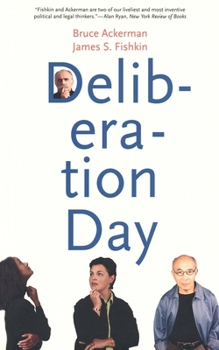Deliberation Day
Select Format
Select Condition 
Book Overview
Two leading political thinkers offer an audacious proposal to energize the electoral process Bruce Ackerman and James Fishkin argue that Americans can revitalize their democracy and break the cycle of cynical media manipulation that is crippling public life. They propose a new national holiday--Deliberation Day--for each presidential election year. On this day people throughout the country will meet in public spaces and engage...
Format:Paperback
Language:English
ISBN:0300109644
ISBN13:9780300109641
Release Date:September 2005
Publisher:Yale University Press
Length:198 Pages
Weight:0.86 lbs.
Dimensions:0.7" x 6.4" x 8.8"
Customer Reviews
2 ratings
AN ANTIDOTE TO SPIN
Published by Thriftbooks.com User , 20 years ago
Full disclosure: I just started a non-profit with the authors to educate people about ideas like Deliberation Day. Our website is at www.CitSov.org. Here's why I joined the effort. At the height of the Cold War, a majority of Americans could not correctly answer whether the Soviet Union was in NATO. It was not. Prior to war with Iraq in 2003, half the public thought that Iraqis were among the 9/11 hijackers. There were no Iraqis. When British citizens were polled recently on whether the nation's constitution is written or unwritten, a quarter answered correctly, a quarter incorrectly, and one-half confessed ignorance. The British "constitution" is unwritten. Six decades of modern public opinion research establishes the general public's unawareness of important factual background to major civic and political debates. That's not snobbery. That's fact, and it's completely understandable. Time spent on public affairs competes with the need for information on more personal matters, such as price and quality of a home or car, in which ignorance can have a direct cost. In contrast, no voter perceives a consequence for voting offhandedly. The outcome of a major election never hinges on a single ballot. Today's political techniques exacerbate the problem of offhanded voting. The science of focus group and public opinion research enables political professionals to identify and exploit the power of different images and slogans, rather than listen to and address the voters' priority concerns. Candidates' time and campaign funds are devoted to efforts to take advantage of preconceptions, not on efforts to inform or engage. The result is that the issues of greatest public interest, such as homeland security, education, health care, and social security, are treated by our politicians as topics for sound bite and image-making manipulation, rather than as priorities for debate and resolution. Deliberation Day adapts an antiquated civic institution, President's Day, to provide voters the opportunity and motivation to make informed citizenship a larger part of their busy lives. By engaging every citizen better, Deliberation Day will transform the quantity and quality of information that is grist for public opinion. In a democracy, public opinion is king. The candidates, the media and political professionals all will adjust to its new demands. Read Deliberation Day. Take a look at www.CitSov.org. Get involved in making it possible for everyone to participate thoughtfully in American politics.
Maybe Best Idea This Year
Published by Thriftbooks.com User , 20 years ago
Deliberation Day would be the name of a two-day national holiday (everyone gets one of the two days) scheduled two weeks prior to a presidential election. Anyone who uses their day off to attend a full-day session discussing the issues in the election will be paid $150.Fishkin has conducted extensive deliberative polling -- sessions in which large groups representative of a society discuss a political issue in depth. He's found that positions shift dramatically, though not necessarily in a predictable direction, as a result of these sessions, that these shifts are the result of increased knowledge, and that participants' new positions have staying power.Ackerman and Fishkin argue that Deliberation Day would better inform and involve a woefully ignorant public, in part through the effects it would have on candidates, the media, activists, and political parties. Testing a sound bite with a focus group would not predict its usefulness in winning over a public that would be deliberating the issue. Politicians would be obliged to develop positions that could withstand examination and substantive debate. Deliberation Day activities would begin with a live televised debate between candidates answering questions from participants in an advance deliberation session. Written materials would also be provided by the candidates. Deliberators would discuss the issues in groups of 15 and take questions to plenaries of 500 at which local representatives of each campaign would respond to questions. Back in their smaller groups, deliberators would discuss their concerns further.When I first heard of this idea, I loved it until I found out a televised debate would be involved. Anyone who watched the Democratic primary debates this season knows how few topics are raised, how little substance is produced, and how biased the affairs are toward the candidates the media prefers. I raised this concern with Ackerman, and he replied that his principal concern was that relying exclusively on written presentations would overly depress turnout.I'm not sure I agree with that, but after reading this book I do agree with including the televised debate, provided it is not conducted by a media corporation with an interest in ratings and in the needs of major corporations, and provided it will - as the authors describe -- involve questions developed through the thoughtful dialogue of a large and representative group of citizens. In fact, televising such a debate would be a significant experiment in and of itself, which if properly promoted and made available would likely accomplish a good bit of what Deliberation Day is intended to do.The design of Deliberation Day is well conceived by the authors and spelled out clearly in 219 pages of detail, including cost and logistics. I'm completely sold, but I have a few concerns. First, how will the campaigns ensure that they have informed representatives in every location who can answer questions? In the recent primaries, I r





